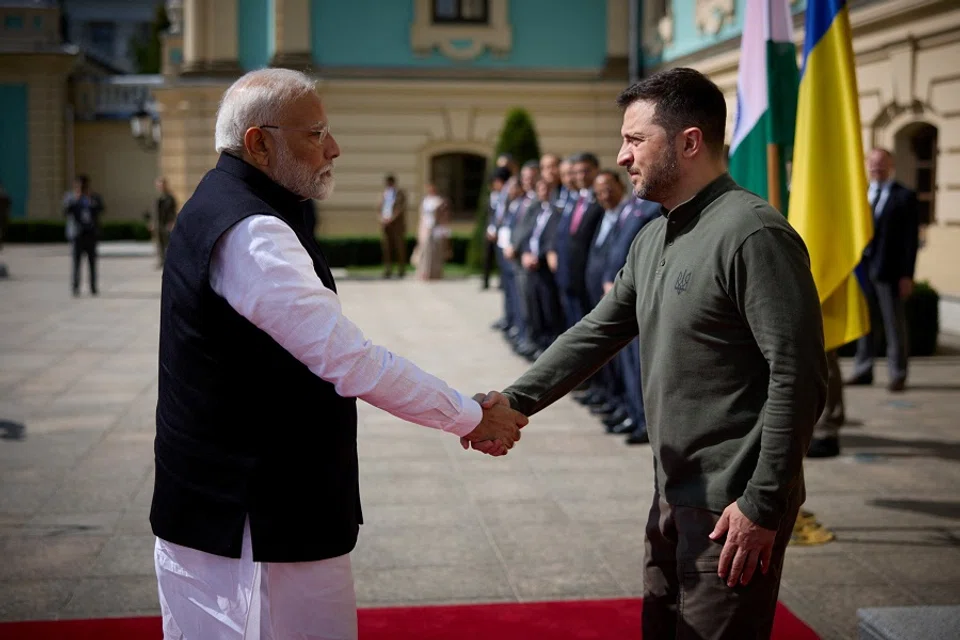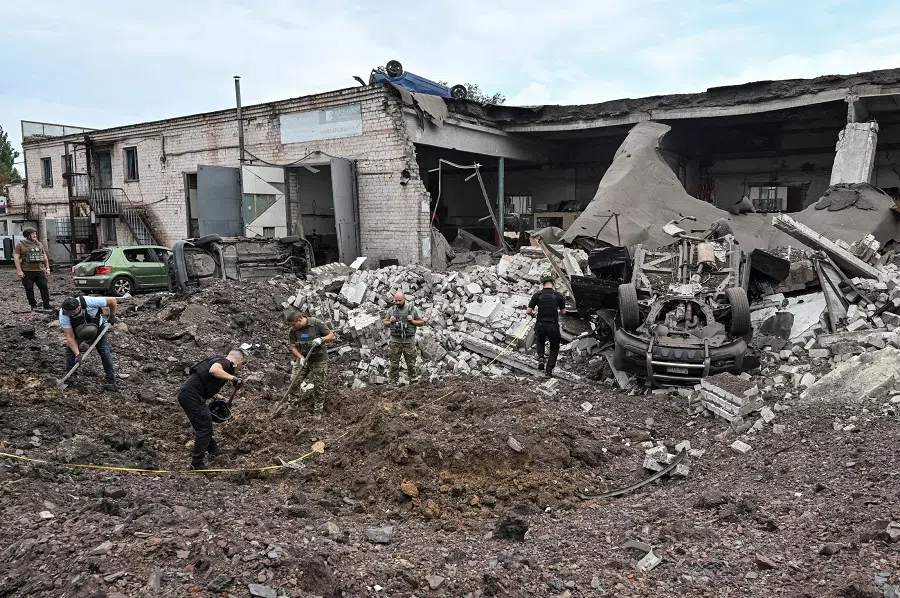Modi’s Ukraine trip: Is India a better peace messenger than China?
Ukrainian President Volodymyr Zelenskyy expected much more from India’s support of Ukraine, including Delhi cutting on its oil imports from Russia, but Prime Minister Modi did not over-promise during his recent visit to Ukraine, notes Indian academic Rishi Gupta.

Prime Minister Narendra Modi concluded his maiden visit to Ukraine on 24 August 2024. This was the first-ever trip by an Indian prime minister since bilateral ties were established in 1992, soon after the disintegration of the Soviet Union and the declaration of Ukraine’s independence.
Prime Minister Modi took a ten-hour train trip from Poland to Kyiv and was welcomed by Ukrainian President Volodymyr Zelenskyy upon his arrival. Prime Minister Modi was seen consoling an emotional Zelenskyy, as the latter spoke about the deaths of children in the war and accused Russian President Vladimir Putin of war crimes.
This symbolism of India’s humanitarian approach to the crisis was important for Delhi, considering Zelenskyy spoke strongly against Modi’s visit to Russia in July. Also, this was one of the few occasions in India’s diplomatic history when the top leader visited the two conflicting parties a month apart.
India’s rising stature in global affairs highlighted
During his visit to Ukraine, Modi extended his role as a potential peace facilitator, which was something he had also conveyed to President Putin during his visit to Russia in July.
However, it is unlikely that President Putin is seeking a mediator at this time, considering Russia launched a strong and largest offensive since launching the war against Ukraine on 26 August — three days after Prime Minister Modi’s Ukraine visit — hitting several regions of Ukraine, including the city of Kryvyi Rih and the capital Kyiv where a major hydropower plant being targeted, with seven lives lost. Russia again attacked the Ukrainian city of Kharkiv on 30 August, killing at least eight civilians.
These attacks are seen as a counter to Ukraine’s recent offensive against Russia and the recapturing of some of the territories in the east. With each party upping its attacks, either party is unlikely to be looking for a peace facilitator. In this escalating conflict, diplomacy appears to be increasingly sidelined.
While India is not the only Asian country advocating for peace in Europe — China has also urged negotiations — India’s position is strengthened by its deepening ties with Europe...
Therefore, what comes out of Modi’s trip is India’s rising stature in global affairs, its capacity to be seen as an influential power, and its ability to advocate peace in addition to the West’s joint efforts in the region.
While India is not the only Asian country advocating for peace in Europe — China has also urged negotiations — India’s position is strengthened by its deepening ties with Europe and the increasing Western support for initiatives like the India-Middle East-Europe Economic Corridor (IMEEC). This bolsters India’s credibility as an influential global player.
Above all, India, as a democratic country, can neutralise Western pressure by leveraging its diplomatic credibility, balancing relationships with diverse global powers, and promoting a multipolar world order that emphasises peaceful coexistence and cooperation over conflict — an approach that China, with its one-party, one-leader model, misses.

From a stipulated 30-minute meeting to an expansive and detailed discussion lasting more than two hours between Prime Minister Modi and President Zelenskyy, the key messaging from the meeting was India’s willingness to broker peace in the region and readiness for further cooperation in “upholding of international law, including the UN Charter, such as respect for territorial integrity and sovereignty of the state”.
Zelenskyy expected more than what Modi offered
However, President Zelenskyy expected much more from India’s support of Ukraine, including Delhi cutting on its oil imports from Russia. But Prime Minister Modi did not over-promise.
The Joint Statement on Prime Minister Modi’s Kyiv visit clearly reflected more on the political lines, and no mention of Russia was found in contrast to the India-Russia Joint Statement in July, which explicitly mentioned “the imperative of peaceful resolution of the conflict around Ukraine”.
Therefore, Prime Minister Modi’s visit to Ukraine was primarily a political gesture, underscoring India’s diplomatic engagement with Ukraine without directly challenging its relationship with Russia.
Also, there were agreements on economic, scientific, technical, cultural and people-to-people ties. Dedicating a section on defence cooperation was certainly unexpected, but again, this was more looking to the future rather than in the immediate. Defence cooperation was in line with India’s quest to become a leading exporter of defence products in the next five years, which has been a key area in Delhi’s “Make in India” policy.
Additionally, India and Ukraine have agreed to strengthen cooperation across key sectors like trade and commerce, agriculture, pharmaceuticals, education, science and technology, and culture while also exploring deeper collaboration in emerging areas such as digital public infrastructure, industry, manufacturing and green energy.
While Ukraine avoids condemning Chinese aggressions, asking India to condemn Russia would be too much to ask.
For Ukraine, a war-hit country, this may not be enough. It would want India to take tangible and outcome-oriented actions, but that would be asking Delhi to punch beyond its weight. The cost of tangible actions for India would mean keeping domestic priorities at bay.
If Ukraine wants India to reduce its oil imports from Russia — given that these imports indirectly finance the war — it shoul also look into India’s overall trade with Russia, including imports of fertilisers and heavy metals, which have remained consistent.
For India, Russia is a strategic requirement which is very much embedded in its national interest. If Ukraine is fighting a war against Russia, India, too, is facing Chinese aggression at the Line of Actual Control (LAC). While Ukraine avoids condemning Chinese aggressions, asking India to condemn Russia would be too much to ask. Therefore, Modi chose to follow India’s signature ”strategic autonomy” to avoid over-offering anything to Kyiv.
China acknowledges Indian efforts but knows Delhi’s limits
Modi’s visit to Ukraine has been met with a cautiously positive reception in China. Although Beijing has not issued an official statement, a researcher said in a Chinese state media article that while “India’s international status has risen in recent years, its influence remains largely confined to South Asia” and “the lack of collective support and limited resources it can dedicate to global issues like the Russia-Ukraine conflict make its role in mediation relatively limited”.
The statement reflects upon India’s tight-knit energy and defence cooperation with Russia. And it is a no-brainer to categorise it as one of India’s pressing limitations.

On the other hand, China has made clear its position on the war, suggesting that the Ukraine crisis requires both parties to sit together and talk as dialogue and negotiations are the only way out of the Ukraine crisis. Like India, China has also maintained neutrality with a pro-Russia leaning as it abstained from sanctions against Russia at the United Nations.
However, what Beijing has done differently than India is an open criticism of the West-led military efforts that support Ukraine. China’s 12-point position paper in February 2023 takes upon NATO, adding that a country’s security should not come at the cost of “expanding military blocks”.
If the Ukraine war brought the West together, it also brought Russia and China closer, with a “no-limits” partnership. However, the turnaround of such a partnership has come at a cost for Russia, especially amid China’s growing outreach to the Central Asian countries.
One of the key reasons that Moscow accepts a “junior partner” role in the equation and ignores Chinese inroads into the Eurasian region is the Russian need for defence equipment amid the ongoing war. A BBC report citing a Carnegie Endowment report in May 2024 added that “Beijing exports more than US$300 million worth of dual-use items — those with both commercial and military applications— to Russia every month”.
The recent visit by General Li Qiaoming, commander of the People’s Liberation Army (PLA) Ground Force to Moscow on 22 August in a follow-up to Chinese Premier Li Qiang’s meeting with President Putin on 21 August amid the Ukrainian offensive on Russia underscores the strategic alignment and mutual support between the two, particularly in the face of Western pressure and ongoing geopolitical tensions, further solidifying their “no limits” partnership despite the challenges posed by the Ukraine conflict.
Even though India and Ukraine are both aware of Delhi’s limited manoeuvring in initiating effective dialogue between Moscow and Kyiv, acknowledgement of his visit by US President Joe Biden on 26 August, followed by Russian President Vladimir Putin on 27 August, highlights the significance of India’s diplomatic efforts. This recognition by key global leaders underscores India’s growing influence and its potential role, albeit limited, in the broader conversation surrounding the Russia-Ukraine conflict.
However, just as China is thought of as being able to play a broker role — which fails to find a welcome from the West in this regard — Delhi has a better chance of being an effective messenger, considering it has well-rounded diplomatic relations and strategic partnerships that span across various global fronts.





